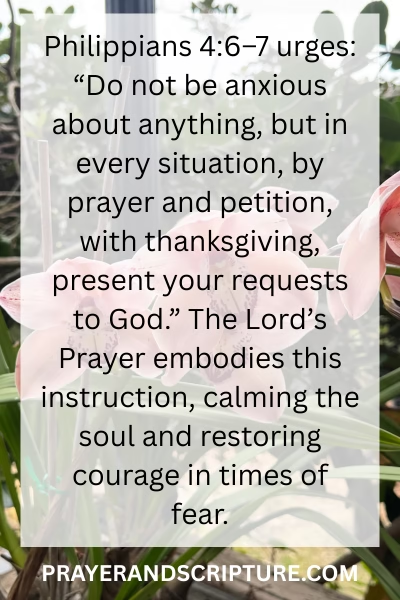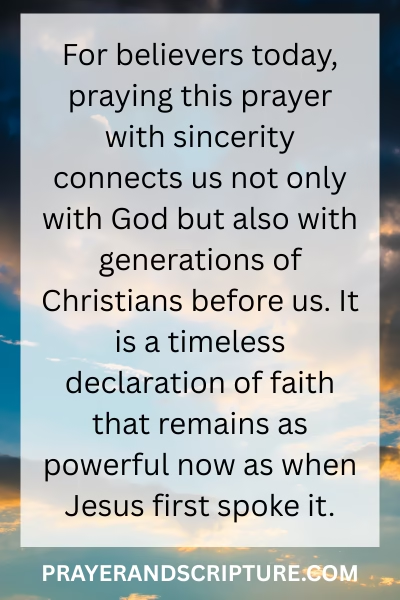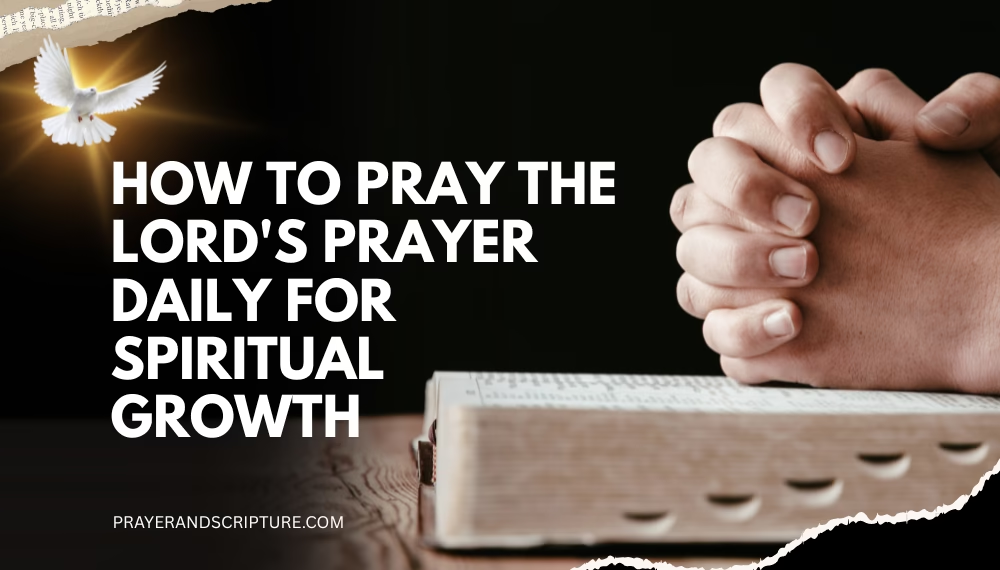The Lord’s Prayer is more than just a set of familiar words recited in churches—it is a divine blueprint for powerful Christian living and faith. When Jesus taught His disciples this prayer in Matthew 6:9-13, He was not only giving them words to repeat but a guide to shape their hearts, thoughts, and spiritual walk. Each line of the prayer reveals a deep truth: God’s holiness, His kingdom, His will, His provision, His forgiveness, and His protection. By praying the Lord’s Prayer with understanding, believers strengthen their daily walk with Christ and invite God’s presence into every area of life.
In today’s world, many Christians are searching for a practical way to deepen their faith, overcome challenges, and live victoriously. The Lord’s Prayer offers exactly that—a step-by-step model to align with God’s heart and live a Spirit-filled life. This article will explore the Lord’s Prayer as a guide for powerful Christian living and faith, unpacking each phrase with biblical meaning, devotional insight, and practical application.
What Is the Lord’s Prayer and Why It Matters for Every Christian
The Lord’s Prayer, found in Matthew 6:9–13 and Luke 11:2–4, is more than just a set of memorized words—it is the very pattern of prayer that Jesus Christ taught His disciples. When the disciples asked, “Lord, teach us to pray” (Luke 11:1), Jesus responded with what we now call The Lord’s Prayer. This prayer is significant because it serves as both a guide and a declaration of faith, shaping how believers approach God.

At its core, the Lord’s Prayer acknowledges God’s holiness, submits to His will, seeks daily provision, requests forgiveness, and asks for protection. Each phrase carries a timeless truth. For example, starting with “Our Father in heaven” reminds us that God is personal, loving, and sovereign over all creation.
For Christians today, praying the Lord’s Prayer is not about empty repetition but about aligning our hearts with God’s purposes. It teaches humility, dependence, and reverence. The prayer is a roadmap that helps us express gratitude, confess sins, and trust in God’s plan.
In a world filled with distractions, the Lord’s Prayer matters because it re-centers us on what is eternal. It’s a prayer of surrender, worship, and confidence in God’s faithfulness—an anchor for both new believers and seasoned Christians.
The History of the Lord’s Prayer in the Bible
The origins of the Lord’s Prayer trace back to the ministry of Jesus Christ. It appears in two Gospel accounts: Matthew 6:9–13 within the Sermon on the Mount and Luke 11:2–4, where Jesus responds to a disciple’s request to teach them how to pray. These two accounts differ slightly in wording, but both reveal the same divine blueprint for prayer.
In Matthew, the prayer is set within a broader teaching about avoiding hypocrisy and empty rituals in prayer. Jesus warns against long, repetitive prayers meant to impress others and instead introduces a short, powerful prayer focused on God’s kingdom and will. In Luke’s version, the prayer is more concise, showing flexibility in how it could be used.
Over time, the Lord’s Prayer became central in Christian worship. Early church writings, including the Didache (1st century AD), encouraged believers to pray it three times a day. This practice highlighted its importance as a daily expression of faith and reliance on God.
Today, the Lord’s Prayer connects Christians across denominations and cultures. Its history shows that from the earliest days of Christianity, believers saw it not just as words to recite, but as a divine structure for communion with God. Its roots in Scripture and tradition remind us of its lasting significance.
The Lord’s Prayer: Meaning Line by Line Explained
Each line of the Lord’s Prayer carries a depth of meaning that goes beyond surface-level understanding. Let’s break it down:
“Our Father in heaven” – This affirms our relationship with God as His children and recognizes His authority in heaven (Romans 8:15).

“Hallowed be Your name” – A call to honor God’s holiness, reminding us to keep His name sacred in our lives.
“Your kingdom come” – A prayer for God’s reign of justice, peace, and love to manifest on earth as in heaven (Matthew 6:33).
“Your will be done” – Submission to God’s plan, trusting that His ways are higher than ours (Isaiah 55:9).
“Give us today our daily bread” – Dependence on God for both physical and spiritual sustenance.
“Forgive us our debts as we forgive our debtors” – A call to receive forgiveness while extending it to others (Ephesians 4:32).
“Lead us not into temptation” – Asking God for strength to resist trials and moral failure.
“Deliver us from evil” – Seeking God’s protection from the enemy’s schemes (2 Thessalonians 3:3).
“For Yours is the kingdom, the power, and the glory forever” – A declaration of praise and surrender to God’s eternal reign.
Line by line, the Lord’s Prayer teaches us how to worship, surrender, trust, and seek God’s presence daily. It is not just a prayer to recite but a framework for living in God’s will.
1. Our Father in Heaven: Understanding God as Our Loving Father
The opening words of the Lord’s Prayer, “Our Father in heaven” (Matthew 6:9), establish the foundation of Christian prayer. This greeting reveals both God’s intimacy and majesty. Calling Him “Father” shows a personal relationship—He is not a distant deity, but a loving parent who cares for His children (Romans 8:15). At the same time, adding “in heaven” reminds us of His sovereignty and supreme authority over all creation.
This dual perspective balances intimacy with reverence. Too often, people either see God as too distant to care or too familiar to respect. Jesus’ words correct both views: God is approachable, yet holy; personal, yet powerful.
For Christians, beginning prayer with “Our Father” also reinforces community. It’s not “My Father” but “Our Father.” This reminds us that prayer is not selfish but communal, connecting us with the global family of faith.
When we pray to “Our Father in heaven,” we are invited to rest in His love, trust His guidance, and honor His majesty. He is near enough to hear our whispered prayers and mighty enough to move mountains on our behalf. This truth assures us that we never approach prayer alone—we come as beloved children before a powerful King.
2. Hallowed Be Thy Name: The Power of Reverencing God’s Holiness
The phrase “Hallowed be Your name” (Matthew 6:9) calls believers to honor God’s holiness. To “hallow” means to set apart as sacred, holy, and worthy of reverence. By praying this, we acknowledge that God’s name—His character, reputation, and authority—must be exalted above all else.
Scripture emphasizes the holiness of God’s name. “Holy and awesome is His name” (Psalm 111:9). When we hallow God’s name, we declare His uniqueness and resist the temptation to treat Him casually. This prayer shifts our focus from personal needs to worship, ensuring that God’s glory comes first.
Practically, hallowing God’s name means living in a way that reflects His holiness. Our words, actions, and choices should point others to the sacredness of who He is. It’s not just about saying the words but embodying them daily.
When believers pray “Hallowed be Your name,” they join the angels in heaven who constantly declare, “Holy, holy, holy is the Lord Almighty” (Isaiah 6:3). It’s a call to worship, reverence, and surrender. This part of the Lord’s Prayer reminds us that before asking for anything, we must first give God the honor due to His holy name.
3. Thy Kingdom Come: Praying for God’s Rule in Our Daily Lives
The petition “Your kingdom come” (Matthew 6:10) is both a prayer for the future and a call for the present. God’s kingdom represents His reign of justice, righteousness, peace, and love. By praying for His kingdom, we long for the day when Christ will return and establish His eternal rule (Revelation 11:15).
But this prayer is not only about the future—it is also about today. When we ask for God’s kingdom to come, we are inviting His rule into our hearts, families, workplaces, and communities. It is a surrender of personal control so that His purposes prevail.

Jesus taught that the kingdom of God is already among us (Luke 17:21). Wherever God’s will is done, His kingdom is manifest. That means when we choose forgiveness over bitterness, peace over conflict, and obedience over rebellion, His kingdom is advancing.
This prayer is deeply transformative. Instead of asking for our own agendas, we align ourselves with God’s eternal plan. We declare that His authority is greater than any earthly power. As believers, our hope is not in governments or human systems, but in the unshakable kingdom of God (Hebrews 12:28).
4. Thy Will Be Done on Earth as It Is in Heaven: Aligning with God’s Purpose
The phrase “Your will be done on earth as it is in heaven” (Matthew 6:10) is a declaration of surrender. In heaven, God’s will is perfectly obeyed without resistance. By praying this, we ask for that same obedience to manifest in our lives and in the world.
God’s will is always good, pleasing, and perfect (Romans 12:2). Yet, submitting to His will requires humility. Even Jesus, in Gethsemane, prayed, “Not my will, but Yours be done” (Luke 22:42). This shows that surrendering to God’s plan, though challenging, leads to ultimate peace and victory.
When we pray for God’s will on earth, we are also asking for transformation in our communities, churches, and nations. It’s a recognition that human wisdom falls short, but God’s wisdom is flawless.
Practically, aligning with God’s will means seeking His direction through Scripture, prayer, and the Holy Spirit. It means obeying even when it’s inconvenient. This part of the Lord’s Prayer challenges us to live in trust, knowing that God’s will always brings life, hope, and eternal blessing.
5. Give Us This Day Our Daily Bread: Trusting God for Provision
The request “Give us this day our daily bread” (Matthew 6:11) teaches us to depend on God for both physical and spiritual needs. Bread represents life’s necessities—food, shelter, health, and strength. By asking for “daily bread,” we express trust in God as our faithful Provider (Philippians 4:19).
This prayer echoes Israel’s experience in the wilderness when God provided manna each day (Exodus 16:4). They could not store it for tomorrow; they had to rely on God’s provision daily. In the same way, Jesus reminds us not to worry about tomorrow but to trust God for today (Matthew 6:34).
Spiritually, Jesus is also the “bread of life” (John 6:35). He nourishes our souls with truth, wisdom, and strength. When we pray this petition, we are not only asking for physical needs but also for spiritual sustenance to walk faithfully with Him.
This line of the Lord’s Prayer challenges us to release anxiety, greed, and self-reliance. Instead of hoarding or fearing lack, we trust in God’s hand to supply all we need. Daily dependence keeps us humble, grateful, and aligned with His care.
6. Forgive Us Our Debts as We Forgive Our Debtors: Living in Forgiveness
“Forgive us our debts, as we also have forgiven our debtors” (Matthew 6:12) is both comforting and challenging. It reminds us that we constantly need God’s mercy, while also calling us to extend that mercy to others.
Sin creates a spiritual debt we cannot repay. Yet through Christ’s sacrifice, God freely forgives us (Colossians 2:13–14). This prayer acknowledges our ongoing need for that grace. However, Jesus links our forgiveness to our willingness to forgive others. In fact, He emphasizes right after the prayer that if we withhold forgiveness, we hinder our own (Matthew 6:14–15).
Living in forgiveness is not easy, especially when wrongs are deep. Yet forgiveness frees us from bitterness and reflects God’s heart. Ephesians 4:32 reminds us: “Be kind and compassionate to one another, forgiving each other, just as in Christ God forgave you.”

This part of the Lord’s Prayer invites us to live in continual mercy—receiving God’s forgiveness and passing it on. In doing so, we break chains of anger, heal relationships, and walk in the freedom Christ secured for us.
7. Lead Us Not into Temptation: Seeking God’s Guidance in Trials
The petition “Lead us not into temptation” (Matthew 6:13) may sound puzzling. God does not tempt anyone to sin (James 1:13). Instead, this prayer asks God to guide us away from situations where our weakness might be exposed or where we may stumble. It is a humble cry for protection and strength.
Life is full of tests and trials, but temptation seeks to draw us away from God’s will. When we pray this line, we recognize our human vulnerability and dependence on God’s guidance. Jesus Himself faced temptation in the wilderness (Matthew 4:1–11), but He overcame through God’s Word.
Practically, this prayer is about discernment—asking God to help us avoid harmful influences, toxic relationships, and situations that pull us from holiness. It’s a reminder to stay alert, as 1 Peter 5:8 warns: “Your enemy the devil prowls around like a roaring lion looking for someone to devour.”
By praying this, we submit our paths to God, asking Him to strengthen us against temptation and lead us into righteousness. It’s not just avoidance—it’s empowerment through His Spirit to overcome.
8. Deliver Us from Evil: Protection Through the Lord’s Prayer
The closing petition, “Deliver us from evil” (Matthew 6:13), is a prayer for spiritual safety. Evil is real, and Scripture acknowledges the enemy’s schemes against believers. But we are not left defenseless—God is our Deliverer.
This prayer echoes Psalm 91:10–11: “No harm will overtake you, no disaster will come near your tent. For He will command His angels concerning you to guard you in all your ways.” Asking for deliverance is asking God to shield us from both visible and invisible dangers.
Evil manifests in temptation, oppression, injustice, sickness, and spiritual attacks. By praying for deliverance, we place ourselves under God’s protection and authority. 2 Thessalonians 3:3 assures us: “The Lord is faithful, and He will strengthen you and protect you from the evil one.”
This petition also reminds us of the victory we already have in Christ. On the cross, Jesus defeated the power of sin, death, and Satan. When we pray “deliver us from evil,” we are standing in that victory and declaring that the enemy has no hold over us.
For believers, this is a prayer of confidence. We are not helpless—we are covered by the blood of Jesus and guarded by the power of God.
9. For Thine Is the Kingdom, Power, and Glory: Ending with Praise
The Lord’s Prayer concludes with a powerful doxology: “For thine is the kingdom, and the power, and the glory, forever. Amen.” (Matthew 6:13, KJV). Though not found in all manuscripts, this ending has been embraced in Christian tradition as a fitting conclusion of worship.
By declaring this, believers affirm that God alone holds eternal sovereignty, limitless power, and everlasting glory. It’s a reminder that prayer is not only about requests but also about adoration. Psalm 145:13 echoes this truth: “Your kingdom is an everlasting kingdom, and your dominion endures through all generations.”
This closing phrase also anchors us in confidence. We do not pray to a powerless deity but to the Almighty who reigns forever. It shifts our focus from personal needs to God’s majesty, ensuring that all glory returns to Him.
When we end our prayers with praise, we align with heaven’s worship, declaring God’s greatness regardless of our circumstances. This ending reminds us that every answered prayer, every provision, and every victory comes from Him alone.
The Lord’s Prayer as a Model for Christian Daily Prayer
Jesus gave the Lord’s Prayer as a model, not a formula. In Matthew 6:9, He says, “This, then, is how you should pray.” Notice, He doesn’t say “repeat these exact words only,” but rather “pray in this manner.” This means the prayer provides a pattern we can follow daily.

The prayer balances worship, submission, provision, forgiveness, and protection. It addresses every key area of spiritual life: honoring God, aligning with His will, trusting for daily needs, receiving and giving forgiveness, and seeking guidance against evil.
When used daily, the Lord’s Prayer centers our priorities. It prevents selfish, shallow prayers and teaches us to approach God with both reverence and dependence. It’s short enough to memorize, yet deep enough to guide a lifetime of prayer.
Praying this model daily reminds us that God is personal and present, that His will is greater than ours, and that His kingdom is advancing. It helps us stay rooted in spiritual discipline, ensuring that prayer is not about performance but relationship.
How to Pray the Lord’s Prayer with Faith and Power
Praying the Lord’s Prayer should never become a lifeless ritual. Jesus Himself warned against “vain repetitions” (Matthew 6:7). Instead, when we pray with faith and power, the Lord’s Prayer becomes a spiritual weapon and a wellspring of strength.
Faith transforms the words into living truth. For example, when we say “Give us this day our daily bread,” we must believe God will provide (Matthew 7:11). When we ask “Deliver us from evil,” we must stand confident that He shields us (Psalm 91:10).
Praying with power means praying with understanding, conviction, and reliance on the Holy Spirit. Each line can be expanded in personal prayer. For instance, “Thy kingdom come” can lead us to intercede for our nation, family, or church.
James 5:16 reminds us: “The prayer of a righteous person is powerful and effective.” When we pray the Lord’s Prayer with faith, it moves beyond words to become a declaration of trust and authority.
This prayer, when embraced with sincerity, can break fear, strengthen faith, and usher in God’s presence in daily life.
The Lord’s Prayer for Beginners: A Simple Step-by-Step Guide
For those new to faith, the Lord’s Prayer is an excellent starting point. Its structure provides a simple yet powerful way to approach God. Here’s a step-by-step guide:
Start with Worship – “Our Father in heaven, hallowed be Your name.” Begin by acknowledging God’s holiness.
Surrender to God’s Will – “Your kingdom come, Your will be done.” Align your heart with His purposes.
Ask for Provision – “Give us today our daily bread.” Present your needs with trust.
Seek Forgiveness – “Forgive us our debts.” Confess and receive God’s mercy.
Release Others – “As we forgive our debtors.” Let go of grudges and extend forgiveness.
Pray for Guidance – “Lead us not into temptation.” Ask for strength to resist sin.
Ask for Protection – “Deliver us from evil.” Call on God’s power to shield you.
End with Praise – “For Yours is the kingdom…” Conclude by glorifying God.
Even beginners can grow in prayer by using this framework daily. Over time, it will shift from memorization to heartfelt conversation with God, deepening faith and spiritual maturity.
Spiritual Lessons Christians Can Learn from the Lord’s Prayer
The Lord’s Prayer is not only a guide for prayer—it is a school of discipleship. Every line carries a spiritual lesson for Christian living. First, “Our Father” teaches us identity—we are God’s children (Romans 8:15). “Hallowed be Your name” teaches reverence, reminding us to keep God at the center of our lives.
“Your kingdom come” teaches surrender, showing that our lives are about God’s plan, not ours. “Give us our daily bread” teaches dependence—we must rely on God daily, not just in emergencies. “Forgive us” teaches humility, while “as we forgive” teaches mercy. “Lead us not into temptation” teaches discernment, and “deliver us from evil” teaches spiritual vigilance.

In essence, the Lord’s Prayer is a roadmap for faith. It teaches humility, worship, dependence, forgiveness, and trust. By praying it regularly, we not only talk to God but also shape our hearts to reflect His will.
How the Lord’s Prayer Strengthens Faith and Hope
Faith and hope are strengthened when we align our prayers with God’s promises. The Lord’s Prayer does exactly that. Each line is rooted in divine truth, fueling both confidence and expectation.
When we pray “Our Father in heaven,” we build faith in God’s fatherly care. “Your will be done” strengthens hope, reminding us that God’s plans are perfect even when life feels uncertain (Jeremiah 29:11). “Give us our daily bread” grows trust in His provision, and “deliver us from evil” reinforces hope in His protection.
Romans 15:13 says, “May the God of hope fill you with all joy and peace as you trust in him.” Praying the Lord’s Prayer with belief fills us with assurance that God is in control. It shifts our focus from fear to faith, from despair to hope, and from self-reliance to God’s promises.
Praying the Lord’s Prayer in Times of Fear, Worry, and Anxiety
Fear and anxiety can overwhelm even the strongest believer. But the Lord’s Prayer offers peace and assurance. When we say “Our Father,” we are reminded that God is near and cares for us (1 Peter 5:7). “Thy kingdom come” shifts our perspective from earthly troubles to God’s eternal rule.
Praying “Give us this day our daily bread” quiets anxiety about the future by anchoring us in today’s provision (Matthew 6:34). Asking for forgiveness and strength releases the weight of guilt and restores peace. Finally, “Deliver us from evil” reassures us that God guards us against unseen dangers.
Philippians 4:6–7 urges: “Do not be anxious about anything, but in every situation, by prayer and petition, with thanksgiving, present your requests to God.” The Lord’s Prayer embodies this instruction, calming the soul and restoring courage in times of fear.

The Lord’s Prayer as a Blueprint for Christian Living
Beyond being a prayer, the Lord’s Prayer is a life blueprint. It shows us how to live as disciples of Christ. Starting with worship (“Hallowed be Your name”), it teaches us to honor God daily. Calling for His kingdom teaches us to live missionally, bringing God’s reign into our families, work, and communities.
Living by “Give us our daily bread” means practicing gratitude and trust in God’s provision. “Forgive us…as we forgive others” calls us to live in mercy and reconciliation, a mark of true Christian maturity. Asking for guidance against temptation teaches us to walk wisely, while praying for deliverance reminds us to stay vigilant in spiritual warfare.
James 1:22 says, “Do not merely listen to the word…Do what it says.” The Lord’s Prayer helps us do exactly that—it moves from words into action, transforming daily living into kingdom living.
Why the Lord’s Prayer Remains Relevant for Believers Today
Despite being over 2,000 years old, the Lord’s Prayer remains timeless and relevant. Its themes—worship, surrender, provision, forgiveness, and protection—speak to every generation. In a world of chaos and uncertainty, this prayer grounds believers in God’s eternal truth.
Modern Christians face busyness, stress, and distractions, yet the Lord’s Prayer recenters the heart. It reminds us to prioritize God’s kingdom, depend on His provision, and walk in forgiveness and freedom. It teaches us to seek His guidance against temptation and trust His deliverance from evil.
Hebrews 13:8 declares: “Jesus Christ is the same yesterday and today and forever.” Because God is unchanging, His Word is always relevant. The Lord’s Prayer continues to be a lifeline of faith, offering both comfort and challenge.
For believers today, praying this prayer with sincerity connects us not only with God but also with generations of Christians before us. It is a timeless declaration of faith that remains as powerful now as when Jesus first spoke it.

Conclusion
The Lord’s Prayer is not just a ritual; it is a living, breathing guide for every believer who desires to grow in faith and walk in the fullness of God’s power. Each phrase calls us to live differently: to honor God’s name, to seek His kingdom, to trust Him for daily needs, to forgive others, to resist temptation, and to rest in His protection. When prayed with faith and applied to daily life, the Lord’s Prayer becomes a roadmap to victorious Christian living.
As Jesus said in Matthew 6:9, “This, then, is how you should pray.” The Lord’s Prayer remains timeless because it addresses every part of the Christian journey—worship, surrender, provision, forgiveness, guidance, and deliverance. If you want to experience a deeper walk with God, let the Lord’s Prayer be your guide for powerful Christian living and faith, transforming your prayer life and strengthening your relationship with Him.
Read more to receive your daily blessing.
- Serenity Prayer Meaning and Interpretation for Daily Life
- Bless Your Day With This Powerful Morning Prayer
- St Francis Prayer
- Powerful Short Prayers to Share Daily With Loved Ones
- Midnight Prayer To Destroy Job Delay and Rejection
- Powerful Prayers To Receive A Miracle Job Without Delay
- Strong Prayer For Favor, Breakthrough And Success In Job Interview
- How to Start a Prayer: 15 Powerful Ways to Talk to God And Get Answers
- Sunday Morning Worship Prayers for Spiritual Renewal



